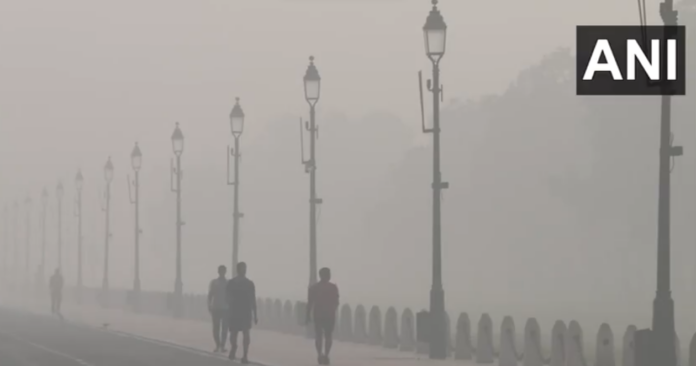New Delhi [India]: The air quality in Delhi has raised concerns amongst the locals and other residents after the AQI which was reeling under the ‘very poor’ category for over a week post-Diwali celebrations has worsened to ‘severe’ category in parts of the national capital.
A dense layer of smog enveloped the city of Delhi for the third consecutive day and the Air Quality Index (AQI) was recorded at 420 as of 9 am on Friday morning, according to the SAFAR.
Drone visuals shot from the AIIMS area in Delhi at 8 am today show reduced visibility as thick blanket of smog covers the entire city.
Likewise, the area near Akshardham Temple in the city was engulfed in smog, with the temple barely visible to the bare eyes on Friday morning.
The smog engulfed the entire Kartavya Path in Delhi, as residents carried on with their usual morning walks despite the poor air quality.
The Air Quality Index in the Anand Vihar area dipped into the ‘severe’ category as per the Central Pollution Control Board (CPCB) and was recorded at 441 early today morning.
Meanwhile, truck drivers in Delhi raised concern about the potential impact on their livelihood as the CAQM ordered the implementation of the Graded Response Action Plan (GRAP-II) in Delhi-NCR from Friday.
With restrictions imposed to limit the movement of BS-III petrol and BS-IV diesel vehicles in Delhi and neighbouring districts, many drivers fear financial hardships, including difficulties in meeting loan repayments for their vehicles.
GRAP stage 3 involved a complete halt on construction and demolition work except for essential government projects, mining and stone crushing and aban on BS III petrol and BS IV diesel vehicles in Delhi and surrounding areas.
The Graded Response Action Plan (GRAP) for the National Capital Region (NCR) is classified under four different stages of adverse air quality in Delhi: Stage I — ‘poor’ (AQI 201-300); Stage II — ‘very poor’ (AQI 301-400); Stage III — ‘severe’ (AQI 401-450); and Stage IV — ‘severe plus’ (AQI >450).
The CAQM Sub-Committee, after an urgent review meeting on November 14, noted that since November 13, the AQI in Delhi had remained firmly in the “Severe” range, with forecasts indicating that it could stay at the higher end of the “Very Poor” category in the coming days.
This year, Stage III has been invoked much later than in 2023, when it was activated on November 2nd. The action plan, effective across the entire NCR, will supplement ongoing Stage-I and Stage-II measures already in place.
The CAQM has urged citizens to follow the guidelines under Stage III, including choosing cleaner modes of transport, working from home when possible, and avoiding the use of coal and wood for heating.
The CAQM also appealed for public cooperation in ensuring the successful implementation of these measures to reduce the health risks posed by the severe pollution in the region.


